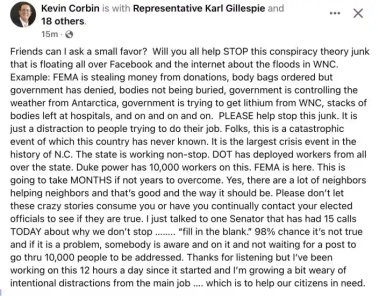DCLMP
DIS Veteran
- Joined
- Jun 28, 2020
- Messages
- 6,885
The whole thing was politicised by the MSM and blamed on one person. It’s still referred to as Bush’s Katrina.The emergency response was awful. FEMA did a great job with what they actually do, which is coordinating resources and allocating the money that Congress and the President authorize. I feel like you think "the government" is a single monolith that is responsible for all aspects of emergency response, from battening down the hatches to staging vehicles and personnel to rescuing people from rooftops to giving cash to operating shelters to rebuilding infrastructure. That's simply not the case. In any disaster, you have:
City and county (governed by local officials such as the mayor and city council):
The city and county must ask for assistance from the state before they can receive it (this is typically done in the form of a pre-emptive disaster declaration once it becomes clear that the area will likely be affected by an upcoming event). At the state level, you have things like:
- First responders such as police, fire rescue, ambulances, etc
- Vital services such as power, water, communications, sewer systems, emergency shelters
- Evacuation plans, as well as locale-specific plans like contraflow (opening all lanes of major highways to traffic leaving the disaster zone) and neutral ground parking (allowing people to park their cars on medians, which in New Orleans are often higher than the roadways)
- Local alerts, such as tornado sirens or flash flood advisories
- Assessment teams to survey the site after the event ends and determine where rescue and recovery efforts are needed
- Volunteer organizations. The larger ones like the Red Cross and the Cajun Navy are well-known to local officials, as are some of the smaller ones that have operated in town previously. They don't officially work for the city or county, of course, but they coordinate closely with the mayor's office to determine where to stage their resources.
If needed, the state can request federal assistance (again, typically in the form of a pre-emptive disaster declaration). At the federal level, FEMA is comprehensively responsible for providing assistance, but it's not that simple. There are 15 different Emergency Support Functions that operate largely independently, but are coordinated by FEMA as a whole:
- State troopers
- National Guard
- Additional equipment and personnel
- Coordinating movement into, out of, and around the disaster zone
- Suspending or passing laws or ordinances to ensure safety or basic needs during the active recovery period
- Providing technical expertise and public health experts (to monitor water supplies, etc.)
- Supplementing local funding
- Acting in a management role when more than one city/town is simultaneously affected, to ensure that resources are fairly distributed and sent to where they are needed most
- Requesting mutual aid from other states
ESF #1: Transportation
ESF #2: Communications
ESF #3: Public Works and Engineering
ESF #4: Firefighting
ESF #5: Information and Planning
ESF #6: Mass Care, Emergency Assistance, Temporary Housing, and Human Services
ESF #7: Logistics
ESF #8: Public Health and Medical Services
ESF #9: Search and Rescue
ESF #10: Oil and Hazardous Materials Response
ESF #11: Agriculture and Natural Resources Annex
ESF #12: Energy
ESF #13: Public Safety and Security
ESF #14: Cross-Sector Business and Infrastructure
ESF #15: External Affairs
There are also 28 disaster response task forces that are primarily in charge of urban search and rescue operations.
Politics
Now, let's not forget that FEMA is a government agency that gets its funding from Congress. So it can only deploy as many resources as Congress is willing to pay for. FEMA itself is apolitical, but it has long been used as a political football, so its available resources are expanded or limited according to which party is in charge.
This is an oversimplification of how disaster logistics work in order to illustrate a point and avoid writing a novel. You can read more for yourself at: https://training.fema.gov/emiweb/downloads/is7unit_2.pdf and https://www.fema.gov/emergency-managers/national-preparedness/frameworks/response
But just from what I've shared here, I hope you're beginning to see how both things can be true. The Katrina response AS A WHOLE was awful. But the part that involved apolitical people at FEMA doing their very best to put cash in people's pockets, get them into safe short-term and, if needed, long-term shelter, and get the ball rolling for the long-term assistance they would need was largely good. And the neighbors helping neighbors bit? Was excellent, the city of Gretna notwithstanding.
What’s make you think this is any better? I’m not seeing positive accounts coming from victims or volunteers or media. Are they lying?


